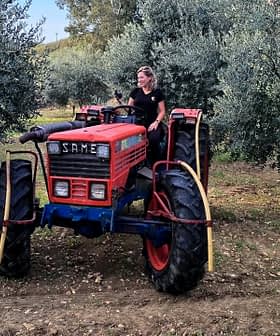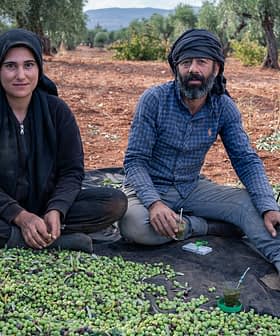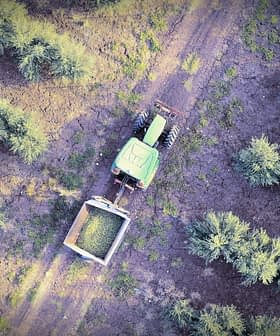Olive Grove Expansion Threatens Endangered Bird Species in Spain
The expansion of olive groves in Andalusia is reducing the habitat of the endangered Eurasian great bustard and little bustard.
 The great bustard (Photo: Attila Terbócs)
The great bustard (Photo: Attila Terbócs) The expansion of olive groves in Andalusia is negatively impacting the habitat of the Eurasian great bustard and little bustard, with new olive groves occupying a significant percentage of their ranges between 2000 and 2018. Conservation groups are concerned about the loss and fragmentation of habitat due to this expansion, leading to calls for improved conservation policies and strategic planning to protect steppe species in the face of changing land use practices.
According to researchers from the University of Córdoba and Ecuador’s Technical University of Manabí, the expansion of olive groves in Andalusia is impacting the habitat of the already scarce populations of Eurasian great bustard and little bustard.
In a research article published in Bird Conservation International, the team evaluated the percentage of different land uses between 2000 and 2018 using data from the Corine Land Cover inventory, a pan-European satellite land survey database, concerning the birds’ natural habitats and known ranges.
They found that over this period, new olive groves occupied 2.14 percent and 2.61 percent of the Andalusian range of the Eurasian great bustard and little bustard, respectively.
Though previously widespread throughout Eurasia, from the British Isles to China, some 60 percent of the surviving population of the great bustard is now confined to the Iberian peninsula.
See Also:Bans on Night Harvesting Have Alleviated Threat to Migratory BirdsThe little bustard has suffered a similar fate. Once breeding as far north as Poland, it has become extinct in its former central-European range over the past few decades.
All bustards are naturally grassland and steppe birds but are well-suited to open arable farmland. It is the conversion of such farmland to olive groves and other woody cropland that the authors believe may threaten the species’ future, not only because of overall habitat reduction but also because of habitat fragmentation.
Though capable of flying vast distances, bustards are primarily ground-dwelling and feed by foraging on vegetation and insects.
Iberian flocks of the great bustard, in particular, appear to migrate only very rarely, and even then for relatively short distances in response to extremes of temperature.
Therefore, “these changes in landscape configuration suggest a decline in both habitat availability and habitat quality for steppe birds that could affect their distribution and population size,” the researchers wrote.
“This article accurately shows the impact of habitat loss in cereal agrosystems in favor of woody crops, in this case, olive groves,” said José Eugenio Gutiérrez, a delegate of SEO/BirdLife in Andalusia and head of the Life Olivares Vivos+ project. “It exposes the effect of this habitat loss on the great bustard and the little bustard, something we already knew, but to which this interesting scientific work puts figures.”
“Although the expansion of olive groves in the last two decades has not been so important quantitatively… it has been qualitatively because it has occurred at the expense of farmland [previously] dedicated to cereal crops and has had an impact on the loss and fragmentation of habitat that has added to that accumulated over previous decades,” he added.
Of particular concern to conservation groups such as SEO/BirdLife is the authors’ observation that “no differences were found in the proportion of new olive groves planted inside and outside of Important Bird and Biodiversity Areas (IBAs) from 2000 to 2018, specifically designated to conserve these steppe birds.”
“This leads us to think that conservation policy should be reviewed and improved to prevent changes in land use from being detrimental to different species,” they added.
In response to this and other studies, both SEO/BirdLife and the Life Olivares Vivos+ project have made numerous recommendations to regional, national, and E.U. government bodies regarding the need to consider the habitats of steppe species when creating agricultural and environmental policy.
Discussing the implications for the new Common Agricultural Policy (CAP), Gutiérrez affirmed his belief that “to conserve our natural heritage (and, as we are seeing, to improve our food independence), stopping this transformation of farmland into woody cropland or solar photovoltaic plants is a top priority that must go through adequate strategic planning at the territorial level, and compliance with the environmental objectives of the new CAP.”
“Biodiversity conservation cannot fall entirely on the shoulders of these farmers who resist change, and until the agri-food market (and consumers) have incorporated biodiversity into the rules of the game, it is time for agricultural policy,” he added.
SEO/BirdLife said that if adequate management plans are in place, the impact can be mitigated. For example, in those cases where olive groves and arable land are interspersed in the so-called “mosaic” landscape that provides an overall benefit to biodiversity, including birdlife.
Share this article









